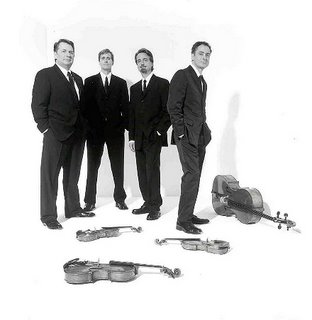Emerson Quartet Concludes Shostakovich Cycle, Part 2
This review is an Ionarts exclusive. Shostakovich wrote in his "memoirs" (Solomon Volkov's widely disputed Testimony) that “fear of death may be the most intense emotion of all. I sometimes think that there is no deeper feeling.” The Emerson Quartet’s Kennedy Center Terrace Theater performance Thursday evening of the composer’s final three string quartets (nos. 13 to 15) was overly laden with a lifetime of baggage and fear. (This concert concluded a live Shostakovich cycle from the previous evening, reviewed by Charles.) For a composer whose years of good health were marred by political suppression, later years by wretched health and why not throw into the mix of a stereotypical Russian and artistic temperament, it might not have been so surprising to see weak audience attendance. Shostakovich, as the program notes state, also wrote that the process of creating these compositions created a “positive effect” in that he later did not fear death so obsessively.
Shostakovich wrote in his "memoirs" (Solomon Volkov's widely disputed Testimony) that “fear of death may be the most intense emotion of all. I sometimes think that there is no deeper feeling.” The Emerson Quartet’s Kennedy Center Terrace Theater performance Thursday evening of the composer’s final three string quartets (nos. 13 to 15) was overly laden with a lifetime of baggage and fear. (This concert concluded a live Shostakovich cycle from the previous evening, reviewed by Charles.) For a composer whose years of good health were marred by political suppression, later years by wretched health and why not throw into the mix of a stereotypical Russian and artistic temperament, it might not have been so surprising to see weak audience attendance. Shostakovich, as the program notes state, also wrote that the process of creating these compositions created a “positive effect” in that he later did not fear death so obsessively.
Quartet no. 13 (B-flat minor, op. 138) was most concise and musically compelling. The work’s meaningful depth is found in its discomfort, yet lack of tragedy. The dark long notes of the first movement contrasted with the jazzy contrapuntal second movement, and piercing viola solo of the third. No. 14 (F-sharp major, op. 142) opened with a folksy, neoclassical Allegretto movement. The final two movements darkened, never finding light at the end of the tunnel through much seemingly wasted lyricism and solo work. No. 15 (E-flat minor, op. 144) uniquely comprises six continuous Adagio movements unified by a rhythmically-varied, unison-three-note motif. While the work’s fascinating textures and string techniques were appreciated, being faced with a composition written purely for selfish release was challenging in that Shostakovich’s pursuit of artistic ideals perhaps took take a backseat. In fairness, perhaps the composer should be lauded for successfully attaining such musical dreariness. The Emerson Quartet is wonderful; however, they lack the near-perfect precision in intonation and ensemble of the soon-to-retire Guarneri Quartet.
The Emerson Quartet's next concert in Washington will continue its Smithsonian Resident Associates series at the National Museum of Natural History (January 31, 6 pm), with a program devoted entirely to Dvořák and Haydn.





















































1 comment:
I've never thought of this work’s meaningful depth being found in that kind of discomfort that also lacks tragedy. Wow. And that's not even to speak of how, out of darkness, there's no finding (ever) of light (any) at the end of the tunnel (way, way back there). Almost a shame for the much, yet only seemingly, wasted lyricism. And the solo work, of course.
But hey, how about three cheers for Shostakovich successfully attaining such musical dreariness in the first place, even if it was a little selfish on his part, no?
In summary: It was, like, totally depressing, eeewww.
Post a Comment